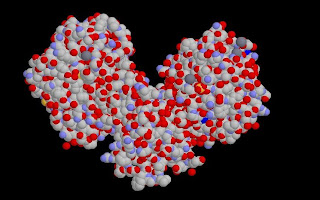This week project........PDB Protein Database
We have another cool software...RasMol 2.7.5.....check out what it does...... we can visualize the protein structure in 3D

The PDB database is updated weekly (on Tuesday). Likewise, the PDB Holdings List is also updated weekly. As of 21 September 2010[update], the breakdown of current holdings was as follows:
| Experimental Method | Proteins | Nucleic Acids | Protein/Nucleic Acid complexes | Other | Total |
|---|---|---|---|---|---|
| X-ray diffraction | 55480 | 1231 | 2605 | 17 | 59333 |
| NMR | 7512 | 925 | 162 | 7 | 8606 |
| Electron microscopy | 214 | 17 | 77 | 0 | 308 |
| Hybrid | 24 | 1 | 1 | 1 | 27 |
| Other | 126 | 4 | 4 | 13 | 147 |
| Total: | 63356 | 2178 | 2849 | 38 | 68421 |
These data show that most structures are determined by X-ray diffraction, but about 15% of structures are now determined by protein NMR. When using X-ray diffraction, approximations of the coordinates of the atoms of the protein are obtained, whereas estimations of the distances between pairs of atoms of the protein are found through NMR experiments. Therefore, the final conformation of the protein is obtained, in the latter case, by solving a distance geometry problem. A few proteins are determined by cryo-electron microscopy. (Clicking on the numbers in the original table will bring up examples of structures determined by that method.)
The significance of the structure factor files, mentioned above, is that, for PDB structures determined by X-ray diffraction that have a structure file, the electron density map may be viewed. The data of such structures is stored on the "electron density server", where the electron maps can be viewed.
In the past the number of structures in the PDB has grown at an approximately exponential rate. However, since 2007 the rate of accumulation of new proteins seems to have plateaued, with 7263 proteins added in 2007, 7073 in 2008, and 7448 in 2009.
Know more about PDB, click here Cool PDB stuff







0 comments:
Post a Comment